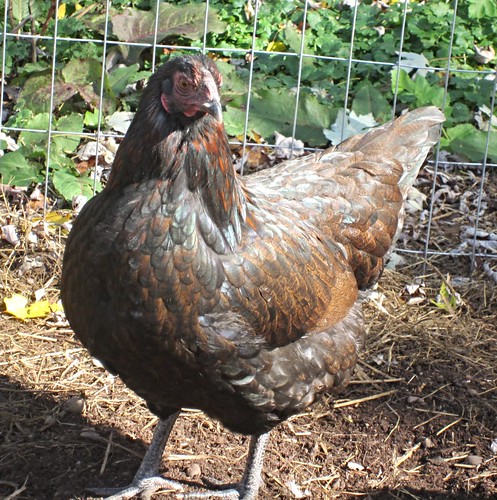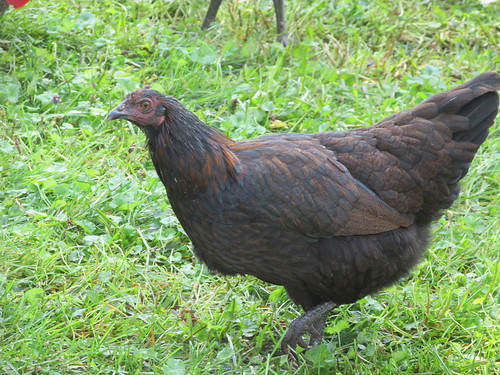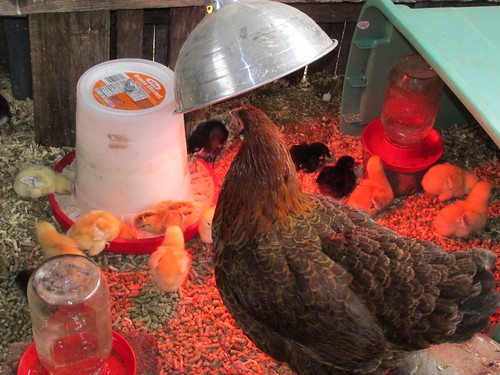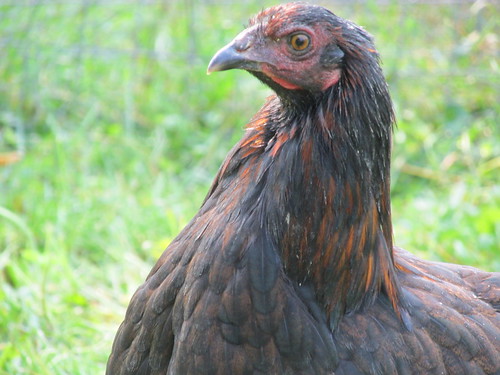Hen Spotlight: Lydia's Daughter Matilda
Happy November 1st!
In the last post, I mentioned that some of the young pullets had begun to lay. One of them that I'd like to highlight in this post is Lydia's daughter, who I've been trying to think of a good name for until this morning. I settled on "Matilda" .

Matilda the beginning of Septemeber

I was going to sell this pullet, but when I was sorting through them several months ago, I realized that it was Lydia's daughter. In case you've never heard of Lydia before, she's a Partridge Chantecler from Ideal Poultry that I got as a chick in 2012. Lydia is not known for her egg production, but her unbreakable "mothering" fixation, known as being a broody hen. Maybe she just doesn't want to be chased by the roosters. Currently, she is raising 22 hatchery chicks who were hatched Sept 23rd.

In 2013 Lydia had a daughter via Michael Jessie, Olive, and she proved to another good broody hen, as long as she didn't share her chicks with another hen. So, I began thinking it might be genetic. Unfortunately, Olive died this spring while raising another clutch of chicks. I wanted another daughter from Lydia, but because of her going broody so frequently, it's hard to coordinate actually getting eggs from her that I can hatch, let alone another pullet! So while Lydia's daughter is not very big and not the prettiest hen, I thought I'd keep her & see if she's as good a mom as her mother is.

Yesterday, I noticed that Lydia's daughter, Matilda, was making funny sounds and acting a little strange when eating. I generally get a day or two notice before Lydia go broody, because she sounds like a "ticking" bomb just about to blow up. Later on in the day, I checked who was in the nesting boxes, and there was Matilda squished in the back of the nesting box "Blackie" the Muscovy duck has been brooding "fake eggs" in. I reached my hand in there, and Matilda raised up the feathers on the back of her neck & gave the tell-tale "growl" of a broody hen. She also had that "glossy-eyed blank" stare that Lydia always gets when she's broody. I put my hand underneath her, and sure enough she didn't budge an inch, just like her mom. It's like she's in a "trance". November is not the time to be hatching out eggs, but what am I supposed to do? If she's anything like her mom, she can't be "broken" from broodiness, plus that's why I kept her. But, I had a solution.
When I came home from Maine, around October 13th, I noticed that one of the adult ducks came out from under the PA coop, and had the "broody duck" signs. I thought, "Oh, no, not another nest of duck eggs!" Sure enough, she had a nice little clutch of duck eggs, and seeing that she'd already begun incubating them, I wasn't going to remove them. Time passed, and just this past week, I decided to "candle" the eggs at night with my L.L.Bean headlamp when closing up the coops. To my surprise, I found 2 green chicken eggs also in the duck's nest. I removed those that had quit or weren't developing. But, I didn't know what to do with the chicken eggs, as they were quite advanced, but previously all chicken eggs under a duck didn't survive the hatching process. I usually found the chick with the egg shell removed via the duck, dead. I didn't want that to happen, but I knew I had to prepare myself for that. Even if the duck eggs hatch, I'm not sure if the ducklings will survive in winter temperatures.
So, when Matilda went broody, I grabbed those green chicken eggs & put them under her. I placed chicken wire over the front of the nesting box, and this morning, she was "sitting tight", with that "glossy-eyed blank" stare. I have not clue when they're hatch, but they have a better chance of surviving with Matilda than with "Blackie" the duck. One thing for sure, it'll be the latest I've ever had any chicks hatch in the year; an experiment for sure!
In the last post, I mentioned that some of the young pullets had begun to lay. One of them that I'd like to highlight in this post is Lydia's daughter, who I've been trying to think of a good name for until this morning. I settled on "Matilda" .

Matilda the beginning of Septemeber

I was going to sell this pullet, but when I was sorting through them several months ago, I realized that it was Lydia's daughter. In case you've never heard of Lydia before, she's a Partridge Chantecler from Ideal Poultry that I got as a chick in 2012. Lydia is not known for her egg production, but her unbreakable "mothering" fixation, known as being a broody hen. Maybe she just doesn't want to be chased by the roosters. Currently, she is raising 22 hatchery chicks who were hatched Sept 23rd.

In 2013 Lydia had a daughter via Michael Jessie, Olive, and she proved to another good broody hen, as long as she didn't share her chicks with another hen. So, I began thinking it might be genetic. Unfortunately, Olive died this spring while raising another clutch of chicks. I wanted another daughter from Lydia, but because of her going broody so frequently, it's hard to coordinate actually getting eggs from her that I can hatch, let alone another pullet! So while Lydia's daughter is not very big and not the prettiest hen, I thought I'd keep her & see if she's as good a mom as her mother is.

Yesterday, I noticed that Lydia's daughter, Matilda, was making funny sounds and acting a little strange when eating. I generally get a day or two notice before Lydia go broody, because she sounds like a "ticking" bomb just about to blow up. Later on in the day, I checked who was in the nesting boxes, and there was Matilda squished in the back of the nesting box "Blackie" the Muscovy duck has been brooding "fake eggs" in. I reached my hand in there, and Matilda raised up the feathers on the back of her neck & gave the tell-tale "growl" of a broody hen. She also had that "glossy-eyed blank" stare that Lydia always gets when she's broody. I put my hand underneath her, and sure enough she didn't budge an inch, just like her mom. It's like she's in a "trance". November is not the time to be hatching out eggs, but what am I supposed to do? If she's anything like her mom, she can't be "broken" from broodiness, plus that's why I kept her. But, I had a solution.
When I came home from Maine, around October 13th, I noticed that one of the adult ducks came out from under the PA coop, and had the "broody duck" signs. I thought, "Oh, no, not another nest of duck eggs!" Sure enough, she had a nice little clutch of duck eggs, and seeing that she'd already begun incubating them, I wasn't going to remove them. Time passed, and just this past week, I decided to "candle" the eggs at night with my L.L.Bean headlamp when closing up the coops. To my surprise, I found 2 green chicken eggs also in the duck's nest. I removed those that had quit or weren't developing. But, I didn't know what to do with the chicken eggs, as they were quite advanced, but previously all chicken eggs under a duck didn't survive the hatching process. I usually found the chick with the egg shell removed via the duck, dead. I didn't want that to happen, but I knew I had to prepare myself for that. Even if the duck eggs hatch, I'm not sure if the ducklings will survive in winter temperatures.
So, when Matilda went broody, I grabbed those green chicken eggs & put them under her. I placed chicken wire over the front of the nesting box, and this morning, she was "sitting tight", with that "glossy-eyed blank" stare. I have not clue when they're hatch, but they have a better chance of surviving with Matilda than with "Blackie" the duck. One thing for sure, it'll be the latest I've ever had any chicks hatch in the year; an experiment for sure!



Comments
Post a Comment